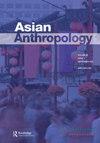活跃与分享快乐:政治参与与主观幸福感的关系探讨
Q2 Social Sciences
引用次数: 0
摘要
在我的论文中,我提供了一种关系方法来研究日本农村的政治参与如何与活动家的福祉联系在一起。虽然现有的研究尚未得出明确的结论,但本研究采用了迭代定性研究设计,确定了如何将这两种现象联系起来的六个维度。基于对该主题的人类学方法,我展示了我的受访者如何在政治行动过程中强调福利的互惠性。在以人口下降和老龄化为特征的日本地区,幸福感主要被解释为一种关系现象,其意义在特定的农村背景下展开,但也位于受访者的日常生活中。我认为幸福不仅与特定地区的自然景观有关,而且最重要的是与他人的享受有关。关键词:幸福政治参与日本农村幸福公民社会披露声明作者未报告潜在利益冲突。本文章由计算机程序翻译,如有差异,请以英文原文为准。
Being active and sharing happy moments: exploring the relationship of political participation and subjective well-being
AbstractIn my thesis, I provide a relational approach on how political participation in rural Japan is linked to the activists’ well-being. While existing research has not come to a clear conclusion, this study uses an iterative qualitative research design that identifies six dimensions of how to link the two phenomena. Based on anthropological approaches to the topic, I demonstrate how my respondents emphasize the reciprocity of well-being in the process of political action. In Japanese regions characterized by demographic decline and aging, well-being is interpreted primarily as a relational phenomenon whose meaning unfolds against the backdrop of a specifically rural context, but is also one situated in the everyday lives of the interviewees. I perceive well-being as something that is not only linked to the natural landscape in that particular area, but is above all connected to the enjoyment of other people.Keywords: Well-beingpolitical participationrural Japanhappinesscivil society Disclosure statementNo potential conflict of interest was reported by the author.
求助全文
通过发布文献求助,成功后即可免费获取论文全文。
去求助
来源期刊

Asian anthropology
Social Sciences-Anthropology
CiteScore
1.60
自引率
0.00%
发文量
25
期刊介绍:
Asian Anthropology seeks to bring interesting and exciting new anthropological research on Asia to a global audience. Until recently, anthropologists writing on a range of Asian topics in English but seeking a global audience have had to depend largely on Western-based journals to publish their works. Given the increasing number of indigenous anthropologists and anthropologists based in Asia, as well as the increasing interest in Asia among anthropologists everywhere, it is important to have an anthropology journal that is refereed on a global basis but that is editorially Asian-based. Asian Anthropology is editorially based in Hong Kong, Taiwan, and Japan, but welcomes contributions from anthropologists and anthropology-related scholars throughout the world with an interest in Asia, especially East Asia as well as Southeast and South Asia. While the language of the journal is English, we also seek original works translated into English, which will facilitate greater participation and scholarly exchange. The journal will provide a forum for anthropologists working on Asia, in the broadest sense of the term "Asia". We seek your general support through submissions, subscriptions, and comments.
 求助内容:
求助内容: 应助结果提醒方式:
应助结果提醒方式:


